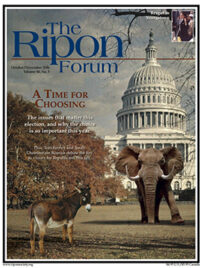As voters prepare for the 2006 election, there are many solutions to a variety of concerns being presented by candidates – gas prices, the war in Iraq, national security, and immigration to name only a few. While all significant, we must also remember the importance of education, not only as a primary issue for voters, but also as something worth being extremely proud of.
Education spans our whole lives, and, in many respects, our state and local governments are best suited to determine the details of how our students are educated. That being said, the federal government plays a significant role in setting the bar and providing the framework.

We first must look to our recent successes in education before looking to what needs to be done going forward. One of the biggest of these successes is the No Child Left Behind Act (NCLB). Over 50 years ago, the country embraced Brown v. Board of Education, which found the doctrine of “separate but equal” unconstitutional, thus guaranteeing every American student a seat in the classroom. While progress has been made since the Brown decision, a huge gap still remains when it comes to ensuring all children actually learn. The federal government has spent more than $300 billion on K-12 education since 1965, yet significant academic achievement gaps between disadvantaged students and their more affluent peers still exist in key subjects such as reading and math.
On January 8, 2002, the NCLB was signed into law with strong bipartisan cooperation. This law seeks to close this gap, and is rooted in the belief that all students – regardless of race, background, income, geography, or disability – can learn, and must be given the chance to do so. For the past four years, the federal government, states, school districts, parents and especially students have been dedicated to reforms that ensure no child is limited. And the progress that was intended when the law was enacted is being made.
The federal government has spent more than $300 billion on K-12 education since 1965, yet significant academic achievement gaps between disadvantaged students and their more affluent peers still exist in key subjects such as reading and math.
According to a report by the Council of the Great City Schools, our nation’s urban schools have made gains in both reading and math since enactment of NCLB. Further, urban school officials credit NCLB with helping teachers and school officials raise student achievement. “Our most recent report attempted to answer the question, ‘Have urban schools improved student achievement since No Child Left Behind was enacted?’ The answer appears to be ‘yes,’” stated Dr. Michael Casserly, executive director of the Council of the Great City Schools.
Under Republican control, we have coupled these effective reforms with increased funding. Since Republicans took control of the House in 1995, federal education funding has increased by nearly 150 percent from $23 billion in FY 1996 to $57 billion in FY 2006. Title I aid for disadvantaged students, the cornerstone of NCLB, has increased by 45 percent since NCLB was signed into law.
While NCLB is awarded most attention, we must also recognize other education accomplishments over the past several years. These accomplishments highlight the breadth of education over a lifetime, with each piece complimenting the next. The Republican Congress has sent expansive reforms to the Individuals with Disabilities Education Act (IDEA) and Carl D. Perkins Vocational and Technical Education Programs for the President to sign into law.
Since enactment in 1975, IDEA has paved the way for millions of students with disabilities to be awarded the rights they deserve within a school. This has lead to record numbers of students completing school and ultimately enrolling in an institution of higher learning. In 2004, we built upon past successes to ensure that children with disabilities are guaranteed a quality education based on high academic standards, as well as to strengthen IDEA’s focus on the educational results of students with disabilities.
I believe strongly that the reforms we passed go a long way in driving program improvement and ultimate success for students across the country.
We have also enacted reforms to strengthen career and technical education, to ensure students have the skills necessary to enter the workforce or continue to an institution of higher learning. Vocational or career education plays a vital role in our educational system by working to prepare youth and adults for the future by building their academic and technical skills in preparation for post-secondary education and/or employment. I believe strongly that the reforms we passed go a long way in driving program improvement and ultimate success for students across the country.
We clearly have a track record of success. We now need the opportunity to continue this reform effort in improving our other education programs, such as Higher Education, Head Start, American Competitiveness and Workforce Investment and the reauthorization of No Child Left Behind.
Every man, woman and child deserves the right to succeed. And when they are armed with a quality education, their chances improve dramatically. The Republican Party remains committed to improving our schools, attracting and retaining highly qualified teachers and encouraging parental involvement. These children are our nation’s future, and we are depending on them.
Michael N. Castle represents the State of Delaware in the U.S. House of Representatives. He serves as Chairman of the House Education Reform Subcommittee.




